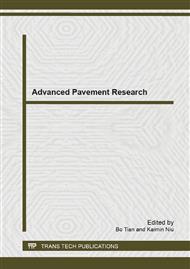[1]
ZhongweiWU. High Performance Concrete[M]. Beijing: China Railway Publishing House, (1999).
Google Scholar
[2]
Huizhen LIAN, Xinying LU. Principles and Methods of High Performance Concrete Design According to Durability Requirement[J]. Architecture. 1(2001)8-11.
Google Scholar
[3]
Verbeck C J,Kiieger P. Studies of salt scaling of concrete[J]. Highway Research Board Bulletin. 1(1957)251-258.
Google Scholar
[4]
Quanbing YANG, Shiyuan HUANG. Physical Mechanism of Deicing Salt on Concrete Spalling[J]. Journal of Shanghai Institute of Building Materials. 6(1991)18-23.
Google Scholar
[5]
R E Beddoe, M J Setzer. A low temperature DSC investigation of hardened cement paste subjected to chloride action[J]. Cement and Concrete Research. 2(1988)249-256.
DOI: 10.1016/0008-8846(88)90009-9
Google Scholar
[6]
Cameron MacInnis, James D Whiting. The frost resistance of concrete subjected to a deicing agent[J]. Cement and Concrete Research. 9(1979)325-336.
DOI: 10.1016/0008-8846(79)90125-x
Google Scholar
[7]
Dirch H Bager, Erik J sellevold. Ice formation in hardened cement paste,part I: room temperature cured pastes with variable moisture contents[J]. Cement and Concrete Research. 5(1986)709-720.
DOI: 10.1016/0008-8846(86)90045-1
Google Scholar
[8]
Jochen Stark,Horst Michael Ludwig. Freeze-thaw and freeze-deicing salt resistance of concrete containing cement rich in granulated blast furnace slag[J]. ACI Materials Journal. 1(1997).
DOI: 10.14359/284
Google Scholar
[9]
J J Völkl,R E Beddoe,M J Setzer. The specific surface of hardened cement paste by small angle X-ray scattering effect of moisture content and chlorides [J]. Cement and Concrete Research. 1(1987)81-88.
DOI: 10.1016/0008-8846(87)90062-7
Google Scholar
[10]
K Hazrati,C Abesque,M Pigeon,T Sedran. Efficiency of sealers on the scaling resistance of concrete in presence of deicing salts[J]. Proceedings of the international workshop in the resistance of concrete to scaling due to freezing in the presence of deicing salt, (1997).
DOI: 10.1201/9781482271553-18
Google Scholar
[11]
J Marchand,M Pigeon,D Bager,C Talbot. Influence of chloride solution concentration on deicer salt scaling deterioration of concrete[J]. ACI Materials Journal. 4(1999)339-348.
DOI: 10.14359/642
Google Scholar
[12]
Mitsuru Saito,Minoru Hota,Hiroshi Ishimori. Chloride permeability of concrete subjected to freeze-thaw damage[J]. Cement and Concrete Composites. 2(1994)71-89.
DOI: 10.1016/0958-9465(94)90035-3
Google Scholar
[13]
Christiane Foy, Michel Pigeon, Nemkumar Banthia. Freeze-thaw durability and deicer salt scaling resistance of a 0. 25 water-cement ratio concrete[J]. Cement and Concrete Research. 4(1988)604-614.
DOI: 10.1016/0008-8846(88)90053-1
Google Scholar


